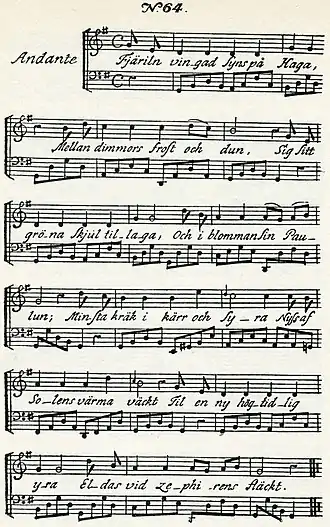Fjäriln vingad syns på Haga
Fjäril'n vingad syns på Haga (The butterfly wingèd is seen in Haga) is one of the most popular of Carl Michael Bellman's collection of songs called Fredmans sånger, published in 1791, where it is No. 64. Many Swedes know the song by heart.

Context
Carl Michael Bellman is the central figure in Swedish song, known for his 1790 Fredman's Epistles and his 1791 Fredman's Songs. He played the cittern, accompanying himself as he performed his songs at the royal court.[1]
Jean Fredman is a fictional character and the supposed narrator in Bellman's epistles and songs, based on a real watchmaker of Bellman's Stockholm.[2] The epistles paint a picture of the demimonde life of the city during the eighteenth century, where strong drink and beautiful "nymphs" like Ulla Winblad create a rococo picture of life, blending classical allusion and pastoral description with harsh reality.[1][2]
Song

The song is dedicated to Captain Adolf Ulrik Kirstein who at the time was Bellman's landlord in Klarabergsgatan, Stockholm.[3]
Fjäriln vingad is in 4
4 time and is marked Andante. The rhyming pattern is the alternating ABAB-CDCD.[4]
The song describes Haga Park, the attractive natural setting of King Gustav III's never-completed Haga castle just north of Stockholm.[5]
Reception
Fjäriln vingad remains popular in Sweden, and is one of the best-known and most often sung of Bellman's songs. It is included in a list of songs that "nearly all [Swedes] can sing unaided".[6] A chime of bells in Solna, near the Haga park described in the song, rings out the melody every hour.[7][8]
An early recording was made by Gustaf Adolf Lund in Stockholm in 1904.[9] Johanna Grüssner and Mika Pohjola recorded it in a medley with "Glimmande nymf" on their song album Nu blir sommar in 2006.[10] In the Zecchino d'Oro in 2005 it was recorded with the Italian title Il mio cuore è un gran pallone.[11]
The song has been translated into English by Henry Grafton Chapman,[12] Charles Wharton Stork,[13] Helen Asbury,[14] Noel Wirén,[15] and Paul Britten Austin.[16] It has been recorded in English by William Clauson,[17] Martin Best,[18][19] Barbro Strid,[20] and Martin Bagge.[21]
References
- "Carl Michael Bellmans liv och verk. En minibiografi (The Life and Works of Carl Michael Bellman. A Short Biography)" (in Swedish). The Bellman Society. Retrieved 25 April 2015.
- Britten Austin, 1967. Pages 61–93.
- Riksarkivet - "Fjäril'n vingad" av Carl Michael Bellman Publicerad: 2006-07-01
- Hassler and Dahl, 1989, pages 232–233
- "Haga rustas för kungligt familjeliv" (in Swedish). Popular Historia. 9 November 2009. Retrieved 9 March 2016.
- Berglund, Anders. "100 sånger - som (nästan) alla kan utantill!" (PDF). Musik att minnas. Retrieved 10 March 2016.
- Couldry, Nick; McCarthy, Anna (23 November 2004). MediaSpace: Place, Scale and Culture in a Media Age. Routledge. p. 130. ISBN 978-1-134-43635-4.
- Rundkvist, Martin (25 August 2007). "Carl Michael Bellman's Butterfly". Aardvarchaeology. Retrieved 9 March 2016.
- "Svensk mediedatabas". Retrieved 18 May 2011.
- "Swedish Traditional Songs - Svenska visor - Nu blir sommar". Blue Music Group. Retrieved 21 April 2016.
- "48° Zecchino d'Oro dal 22 al 26 Novembre 2005: Il Mio Cuore e' un Gran Pallone (Fjäriln)". Zecchino d'Oro. Archived from the original on 2015-09-23. Retrieved 21 April 2016.
- Songs of Sweden, trans. by Henry Grafton Chapman, (New York: G. S. Schirmer, 1909).
- Anthology of Swedish Lyrics, 1750-1915, trans. by Charles Wharton Stork, (New York: The American-Scandinavian Foundation, 1917).
- Scandinavian Songs and Ballads, trans. by Helen Asbury, Martin S. Allwood et al., (Mullsjö: Anglo-American Center, 1950).
- Sweden Sings, trans. by Noel Wirén, (Stockholm: Nordiska Musikförlaget, 1955).
- Fredman's epistles & songs, trans. by Paul Britten Austin, (Stockholm: Reuter & Reuter, 1977).
- Summer in Sweden (Stockholm: Sveriges radio, c. 1962).
- To Carl Michael With Love (Stockholm: HMV, 1975).
- Songs of Carl Michael Bellman (Monmouth, Great Britain: Nimbus Records, 1983).
- Listen to Carl Michael Bellman! (Stockholm: Proprius, 1999).
- Fredman's epistles and songs (Stockholm: Proprius, 2002).
Sources
- Britten Austin, Paul. The Life and Songs of Carl Michael Bellman: Genius of the Swedish Rococo. Allhem, Malmö American-Scandinavian Foundation, New York, 1967. ISBN 978-3-932759-00-0
- Britten Austin, Paul. Fredman's Epistles and Songs. Stockholm: Proprius, 1990 and 1999.
- Hassler, Göran (1989). Bellman – en antologi [Bellman – an anthology]. Illustrated by Peter Dahl. En bok för alla. ISBN 91-7448-742-6.
- Kleveland, Åse (1984). Fredmans epistlar & sånger [The songs and epistles of Fredman]. Illustrated by Svenolov Ehrén. Stockholm: Informationsförlaget. ISBN 91-7736-059-1. (with facsimiles of sheet music from first editions in 1790, 1791)
